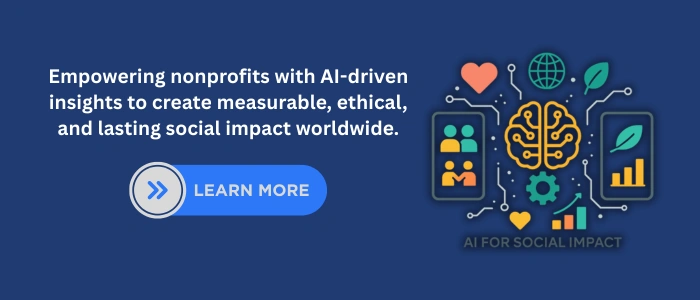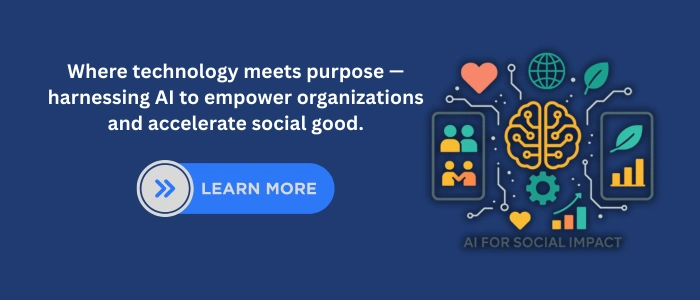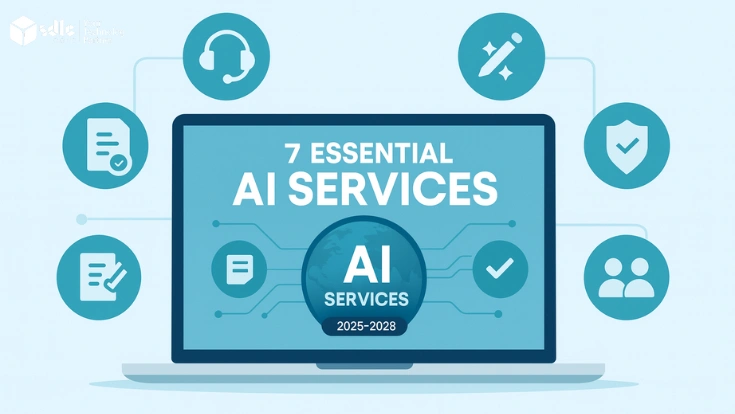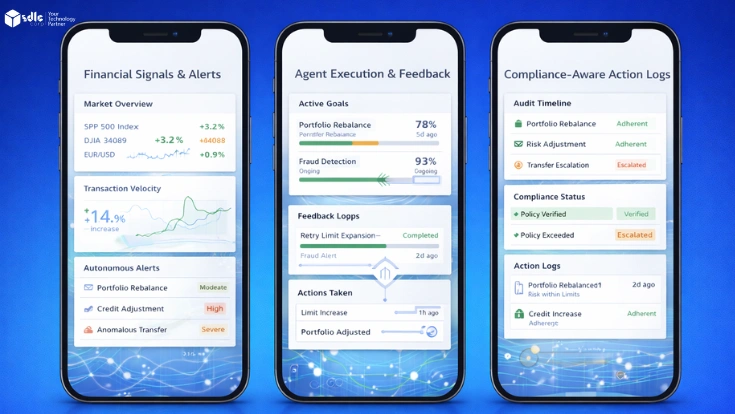Introduction
AI for social impact is transforming how nonprofits operate, optimize resources, and amplify their missions. Today, organizations across the globe rely on artificial intelligence to analyze data, predict trends, and make smarter decisions. Moreover, AI allows social enterprises to identify community needs faster, automate repetitive work, and measure results more accurately.
As funding challenges increase, efficiency and accountability have become vital. Therefore, nonprofits are adopting AI solutions to improve transparency and scale their reach. For instance, predictive algorithms help detect disease outbreaks, optimize logistics for aid delivery, and match donors with causes effectively. In addition, machine learning tools enhance volunteer coordination and fraud detection in large-scale initiatives. As a result, nonprofits can focus more on creating sustainable change rather than managing complexity. Ultimately, AI is not just an innovation—it’s a trusted partner in driving measurable social impact.
Why AI Is Now a Core Driver of Social Good

Artificial intelligence empowers nonprofits to work smarter, not harder. It helps organizations evaluate programs, predict needs, and distribute resources strategically. Furthermore, AI systems identify inefficiencies in service delivery and uncover new opportunities for community support. Because of this, humanitarian groups are increasingly embedding AI analytics into their operations. For example, real-time machine learning models allow faster disaster response and equitable resource allocation. Consequently, nonprofits can achieve broader outcomes with fewer resources, building long-term resilience and trust.
To explore how digital innovation shapes this growth, check out AI Consulting Solutions for Social Enterprises.
Strategic Planning and Guidance for Social Impact AI
Before rolling out AI systems, organizations need clarity on use cases, risks, and governance. Expert insights help establish evaluation criteria, ethical safeguards, and measurable impact goals.
Engaging a AI consulting company early in the strategy phase can support nonprofits in defining how generative models and predictive systems fit with mission goals, data ethics, and transparency practices.
Key Capabilities of AI for Social Impact
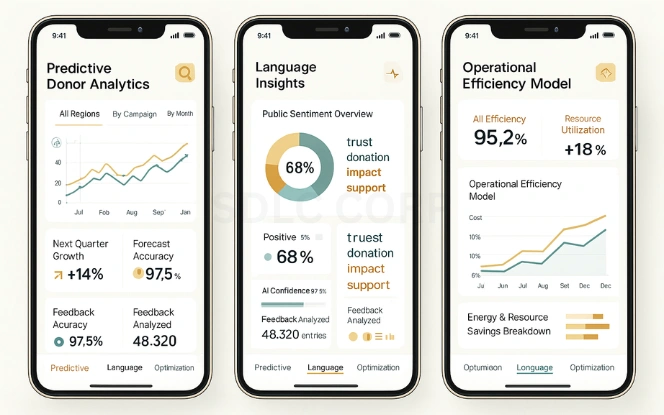
AI-driven solutions extend across several vital areas:
- Predictive Analytics: anticipate donation trends, supply shortages, or community health issues.
- Natural Language Processing (NLP): analyze surveys, feedback, or public sentiment in multiple languages.
- Computer Vision: identify infrastructure gaps using satellite images or map disaster-affected regions.
- Optimization Models: streamline logistics, improve fundraising, and reduce waste.
Additionally, AI enables faster decision-making while minimizing human bias. When used responsibly, it enhances inclusion and fairness within humanitarian systems.
Learn more about custom-built systems and automation tools on our Machine Learning Development page.
Practical Use Cases of AI in Nonprofits
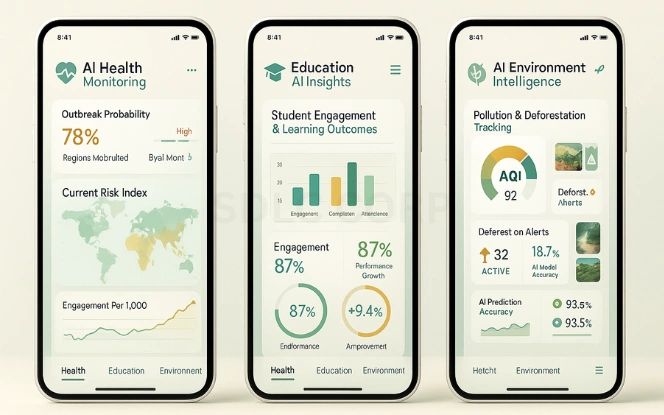
AI is already solving real-world challenges in nonprofit sectors:
- Healthcare: algorithms predict epidemics and support remote diagnostics in rural areas.
- Environment: computer vision tools monitor deforestation and track pollution sources.
- Education: adaptive learning platforms personalize teaching for underserved students.
- Disaster Relief: predictive modeling supports early evacuation planning and risk assessment.
- Fundraising: AI chatbots improve donor engagement through personalized communication.
Moreover, data from these initiatives reinforces transparency and boosts donor confidence. Hence, nonprofits can demonstrate measurable results, strengthening their credibility.
Challenges and Ethical Considerations
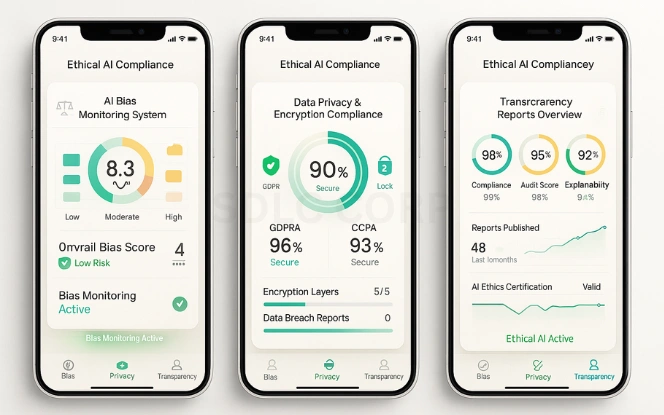
Despite its benefits, AI implementation in social sectors must be carefully managed. Privacy protection, algorithmic bias, and ethical data collection are ongoing concerns. Therefore, nonprofits must adopt frameworks emphasizing fairness, accountability, and explainability. Additionally, collaboration with responsible tech partners ensures models remain transparent and unbiased. Building public trust is essential since communities depend on data-driven decisions for their welfare. When used ethically, AI becomes a tool for empowerment rather than exploitation.
Dive deeper into responsible innovation practices through our article on Ethical AI Development Frameworks.
Steps to Adopt AI in Nonprofit Organizations
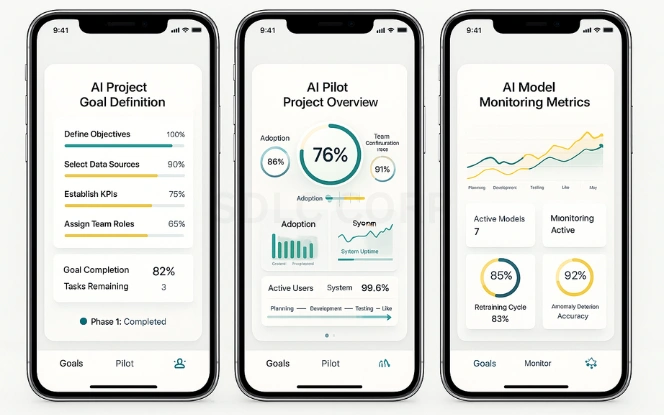
Successful AI adoption requires a structured approach:
- Define clear goals: identify the problem AI should solve.
- Collect clean data: ensure it is relevant, diverse, and unbiased.
- Collaborate with experts: partner with ethical AI developers or data scientists.
- Pilot projects: start small and scale gradually.
- Monitor performance: continuously refine models using measurable feedback.
Furthermore, leadership must invest in staff training to ensure long-term sustainability. With this foundation, organizations can unlock AI’s full potential responsibly.
Measuring the Impact of AI Projects
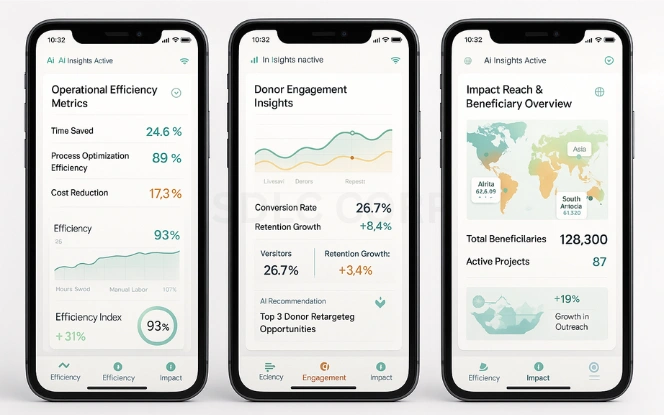
Tracking the real outcomes of AI initiatives ensures transparency, credibility, and long-term sustainability. Nonprofits can evaluate progress using clear, quantifiable indicators to prove the value of AI-driven change.
Key areas to measure include:
- Operational Efficiency: assess reductions in processing time or administrative workload.
- Cost Optimization: track how AI helps save resources and streamline logistics.
- Impact Reach: measure how many people or regions benefit from AI-supported programs.
- Decision Accuracy: evaluate prediction success rates and data model precision.
- Donor Engagement: review how AI-driven personalization boosts fundraising performance.
Additionally, visual dashboards can display insights in real time, helping leaders make data-informed decisions. Consequently, nonprofits that track these metrics gain stronger support from donors and partners.
The Future of AI in Social Impact
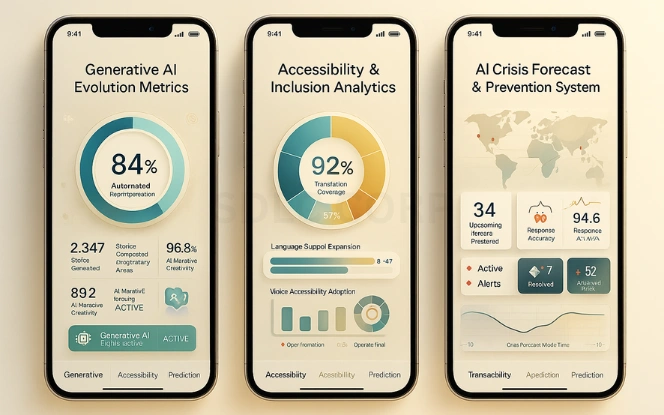
AI’s future in social impact is rooted in scalability, accessibility, and ethics. The technology will continue reshaping how nonprofits plan and execute their missions.
Emerging directions include:
- Generative AI for storytelling: automatically summarize program outcomes for reports and proposals.
- AI-driven accessibility: enhance inclusion through speech recognition and translation tools.
- Predictive analytics for prevention: identify potential crises before they escalate.
- Real-time transparency tools: use blockchain-integrated dashboards for donor accountability.
- Sustainability-focused AI: optimize resource usage for environmental and humanitarian goals.
As AI evolves, its integration must remain guided by ethical principles. By combining compassion with computation, nonprofits can redefine how technology supports human progress.
Stay informed about emerging innovations in this field by reading AI Trends Transforming Business and Society.
Enterprise-Level Platforms for Scalable Social Impact AI
As social impact organizations grow, they need consistent governance, monitoring, and interoperability across programs and regions. AI platforms that support large-scale analytics, shared model repositories, and secure data governance help maintain alignment across teams.
Design frameworks used by an enterprise AI development company can inform how such systems are structured to support cross-functional teams and compliance needs.
Conclusion
Artificial intelligence is revolutionizing the social impact landscape. It enhances efficiency, transparency, and decision-making for mission-driven organizations. Through predictive insights and ethical frameworks, nonprofits can solve complex problems with precision. Therefore, integrating AI into social initiatives is not just beneficial it’s essential for scaling change responsibly.
Contact us at SDLC Corp to explore AI-driven solutions that empower your mission. Hire AI Development Services with SDLC Corp and transform your nonprofit operations today.
FAQs
How Can AI for Social Impact Help Nonprofit Organizations Grow?
AI for social impact helps nonprofits by automating repetitive tasks, predicting trends, and analyzing community data. These capabilities enable faster decision-making, improved transparency, and optimized resource allocation for measurable social good.
What Are The Key Benefits Of Using AI In Nonprofit Organizations?
AI in nonprofit organizations increases efficiency, reduces human error, and improves donor engagement. Additionally, it helps track social metrics in real time, making campaigns data-driven and outcomes more impactful.
How Do Nonprofits Measure The Success Of AI Projects?
Nonprofits can measure AI success by tracking performance indicators such as cost reduction, process speed, outreach growth, and donor retention. Furthermore, visual dashboards provide transparent, data-backed results for stakeholders.
What Ethical Challenges Exist When Implementing AI In Social Impact Work?
The most common challenges include bias in datasets, data privacy issues, and lack of accountability. However, adopting ethical AI frameworks ensures fairness, transparency, and responsible innovation for all nonprofit AI initiatives.
Why Should Nonprofits Partner With SDLC Corp For AI Development?
SDLC Corp specializes in developing AI solutions for nonprofits, focusing on ethical innovation, scalability, and measurable results. Partnering with SDLC Corp ensures organizations leverage cutting-edge AI responsibly to drive sustainable social impact.

